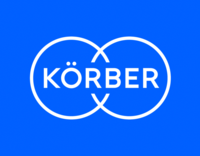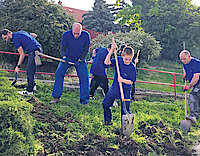Gabriele Fanta has headed the Human Resources department of the international technology group since December 2020. She is responsible for global HR management at Körber, including recruiting, employee development and employer branding.
Ms. Fanta, Körber wants to be a fair and attractive employer. What are you doing in this regard?
We are still quite young as an employer brand. About two years ago we started to unite our numerous companies from different industries under the common brand “Körber.” From September, the Business Area Tobacco will also operate under the Körber brand. At the moment it still appears on the market as “Hauni.” As “Körber” we can more effectively show the public who we are and what we stand for.
How are you doing this?
An important boost was our first global 24-hour, virtual Körber Career Day last year. We started early in the morning in Asia and followed the sun across the globe, ending back in Europe the next morning. Prospective applicants could follow our online program around the clock and get to know all facets of the Körber Group. Two hundred colleagues were involved worldwide, both in the background during the preparations and actively in front of the camera, as they presented themselves, their jobs, and their locations by means of virtual tours and videos. This clearly showed the great diversity of the people who work with us at Körber.
How did people respond to the format?
It was fantastic! There was consistently positive feedback from the participants and also from our colleagues who took part. The number of applications rose by around 40 percent immediately after the event.
For applicants as well as long-serving employees, diversity, equity, and inclusion, or DEI for short, are central topics in the professional environment. How is Körber positioned in this regard?
Diversity can’t be decreed. It has to evolve within the company. Körber has the ideal conditions for that to happen. We have steadily grown internationally, and as a globally operating group we unite numerous nationalities and ethnic groups within the company. For us it’s quite normal to be a multicultural organization and to respect our differences. In terms of age, we’ve got all of the working-age generations here.
What about gender identity and sexual orientation?
Neither one plays a role in our recruitment and development activities. In other words, we don’t want to label anyone as only a woman, a manager, an employee with a migration background or a homosexual employee. That’s why our recruiters receive “unconscious bias” trainings, where they learn to question their own perceptions and to avoid thinking in stereotypes in job interviews. Our employees are recognized for what they achieve and what they stand for. That is our principle. External or personal characteristics play no role in our working environment.
Where does Körber stand in terms of inclusion?
Inclusion is about integrating people with mental or physical impairments into daily work processes. And we’re on the right track here. In the future we will work more closely with the German Federal Employment Agency. First of all, it’s important to find out whether there are people at our organization who have an impairment but don't dare to make it public. An impairment is not always a visible disability, for example in the case of our deaf trainees. Many people have mental disabilities or physical impairments that are not immediately visible. Of course we also want to integrate these people as well as possible. Together with the German Federal Employment Agency, we want to find out which jobs and profiles we can offer to them at Körber.
What makes Körber special as an employer?
We communicate openly with one another. No supervisor or board member hides in a closed-off area or even on a separate floor. All employees can engage in a dialog with managers and board members at any time. The contact details are visible to all, and everyone can be reached directly via numerous channels. This opportunity is used frequently. In our daily interactions, hierarchical communication structures have long since dissolved.
Where is there still room for improvement?
One of our major goals is to increase the proportion of female managers.
This is currently 14.3 percent. If you consider that women make up 19.7 percent of our employees, that’s not so bad. However, it is and will continue to be an adjustable target, because not every female employee wants to be a manager. The relevant factors include experience, a certain level of maturity and, last but not least, the number of working hours that are required. Leading a larger team part-time can be difficult. Of course we are experimenting with job sharing in such areas as well. One positive effect of the corona pandemic for our company is that some of our part-time female employees have increased their hours, because there’s no longer any commuting when you work from home. Besides, all of us have now learned how to do management work remotely. That can be a great opportunity for talented women and men who want to, or have to, take care of family members.
Why is that, and what changes do you want to make?
In mechanical and plant engineering as well as in digital and technology companies, the number of female employees is unfortunately much lower than in other sectors of industry. This could be changed if many more women were trained in technical and digital professions, and if these women apply for vacancies in our organization. I advertise this wherever I can — #female talents welcome. And maybe companies that are more technology-oriented offer an environment with more opportunities, precisely because they have fewer women employees.
However, diversity is not limited to female or male colleagues...
You’re absolutely right. I actually have a holistic understanding of diversity — and that also applies to Körber as a whole. It starts with people’s ethnic background and goes all the way to methods and working times that can be designed individually and flexibly wherever possible. We consider it important to lead mixed teams successfully, whether online or offline. It’s basically a question of achieving very good results efficiently, regardless of where the employees come from, how old they are, who they love or where they work. In this regard we’re on the right track in all of our Business Areas. We are in the middle of a comprehensive transformation, and it’s far from over.











